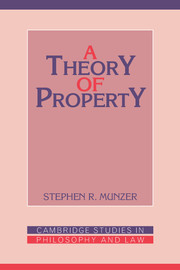Book contents
- Frontmatter
- Contents
- Preface and acknowledgments
- 1 Property, justification, and evaluation
- Part I Property rights and personal rights
- Part II From individuals to social context
- Part III Justification and distributive equity
- 8 Utility and efficiency
- 9 Justice and equality
- 10 Labor and desert
- 11 Conflict and resolution
- Part IV Applications
- Table of cases
- Index of names
- Index of subjects
11 - Conflict and resolution
Published online by Cambridge University Press: 05 June 2012
- Frontmatter
- Contents
- Preface and acknowledgments
- 1 Property, justification, and evaluation
- Part I Property rights and personal rights
- Part II From individuals to social context
- Part III Justification and distributive equity
- 8 Utility and efficiency
- 9 Justice and equality
- 10 Labor and desert
- 11 Conflict and resolution
- Part IV Applications
- Table of cases
- Index of names
- Index of subjects
Summary
PLURALISM AND CONFLICT
This book has now argued for three principles that justify, and limit, public and private property: utility and efficiency, justice and equality, and desert by labor. As § 1.2 observes, although these may not be the only principles that make up a satisfactory moral, political, and legal theory of property, they are by far the most important. Yet since this is a pluralist theory, conflicts can occur between or among the principles.
To make the topic of conflict more concrete, imagine that a legislature has asked a social planner to formulate an income policy based on the three principles. The planner has a staff that includes economists, demographers, statisticians, and social psychologists. She and her staff first survey the incomes of all persons in the state, and break down income from employment by type of job, employer, region, sex, race, and other factors. She then attempts to determine whether her findings are justifiable under the three principles. Her preliminary determination is that most incomes square well with the principles and that little reason exists to disturb income from other sources such as investment.
However, several problem areas come to light. Because of imperfections in the labor market, many executives and upper-level managers in manufacturing receive incomes well in excess of those justified by the labor-desert principle and the principle of utility and efficiency.
- Type
- Chapter
- Information
- A Theory of Property , pp. 292 - 314Publisher: Cambridge University PressPrint publication year: 1990

